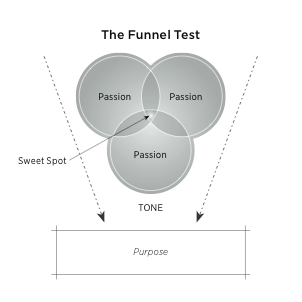Success Advice
How To Properly Define Your Passions & Purpose

Over the years, I’ve worked with many companies and found the ones with lucid and succinctly described visions are more likely to succeed than those with unclear or highly complex visions. Yet as individuals, we often don’t take the time to clearly articulate our own passions or purpose. To help you define yours, I’ve created a simple test that I call The Funnel Test.
The following is an excerpt from Your Network Is Your Net Worth: Unlock the Hidden Power of Connections for Wealth, Success, and Happiness in the Digital Age by Porter Gale, former VP of Marketing for Virgin America.
Define Your Passions & Purpose With The Below Funnel Test:

Step 1: Define your three greatest passions or a succinct set of words that clearly define your core interests
You can put a high priority on any type of passion, from family to fitness or education to the environment. For example, I watched my mother build a network based on her passions of volunteering, family, and fitness when, after having lived her entire life in Minnesota, she moved to California to be closer to her family. Within sixty days of arriving, my mother joined a master’s swim team, found a group of women who played tennis at the park, and became an alternate in a golf foursome.
If you can find activities, work, or relationships that combine two or more of your core passions, you are likely to hit the jackpot and be more effective in and excited about your actions and activities.
Next, grab a pen and make three columns, one for each passion. Make a commitment to improve, particularly where your involvement is limited. Let’s say that if you’re passionate about photography, make a commitment to go to photography exhibits several times a year and find online communities about the topic.
For example, two of my goals are to take an improvisation class as a way to nurture my interest in storytelling and to go on weekly hikes with friends to support my passion for health.
Step 2: Define your desired tone
How do you want to present yourself to the world? What is your authentic voice? Are you quiet and reserved? Witty? Bold? Irreverent? To use the example of my mom again, I’d define her tone as reserved. She’s understated and is more likely to listen first and talk second.
Now fill the space below your passion circles with a selected word for your tone. Like a funnel, where the contents flows from top to bottom, envision all of your actions being influenced by your tone. Remember, simple is good.
Step 3: Define your core purpose in twenty words or less
What do you want to accomplish in life and work? Write what is in your gut, and look at the passion words in your Funnel Test. Your goal is to write a phrase of fewer than twenty words that describes your purpose.
My recommendation is to keep this as simple as possible. Some brands and companies do this, and it also happens to be a valuable exercise for self-reflection for any individual.
Fred Reid, the founding chief executive officer of Virgin America, shared with me how the airline’s purpose, “To create an airline people love”, was born: “I had written it on a paper and had thrown it into the trash. I initially thought it was too simplistic, but that is what we wanted to do. Can you imagine? Have an airline people loved?” After some deliberation, Reid and the founding team kept coming back to the simple phrase and decided it was the perfect mantra for the start-up that faced a complicated uphill battle prior to liftoff in 2007.
Sometimes we have to make sacrifices or take baby steps in the short-term to help us get to where we want to be. However, if you don’t even know where you want to go, it will be even harder to get there.
Once you’ve defined your passions and developed a focused purpose, your networking efforts will be more effective and authentic. Use this test as a filter to help you guide your activities and meetings.
Stay optimistic, stay productive, and be the best you can be. Stay focused on your purpose, but know there is potential learning in every action.
Do you have any suggestions on how someone can define your purpose and passions? Please suggest your thoughts below!
Business
Scaling a Business? Here’s What Usually Goes Wrong
Before you hire, expand, or chase bigger revenue, here’s what every founder needs to fix to scale without losing control, culture, or quality.

Growing a business is the dream. But scaling one? Honestly, that is a completely different reality. (more…)
Personal Development
From Classroom to Boardroom – How to Transition Successfully
Moving from classroom to corporate? Here’s how to navigate career transitions, master workplace culture, and stand out in the boardroom.

The transition from academic life to corporate work is major and often tough, requiring careful planning and preparation. (more…)
Did You Know
This Move Can Help You Keep More of Your Income
What if keeping more of your income wasn’t about earning more, but choosing a smarter place to live?

Living more cheaply often makes the biggest difference when money is tight. If rent feels too heavy or bills climb faster than expected, changing where you live might help a lot. (more…)
Business
How to Build a Brand That Actually Connects (For Businesses of Any Size)
Brand growth in 2026 isn’t about shouting louder; it’s about clarity, consistency, and human connection that customers genuinely trust.

In the middle of a busy workday, it’s easy to view brand building as a luxury. Honestly, we often treat it like a coat of paint we apply after the house is built. But as we navigate the landscape of 2026, it’s become clear that branding is actually the foundation. (more…)
-

 Business4 weeks ago
Business4 weeks agoWhat Every Business Owner Should Know Before Investing in API Integration
-

 Business4 weeks ago
Business4 weeks agoWhy Smart Entrepreneurs Are Quietly Buying Gold and Silver
-

 Business3 weeks ago
Business3 weeks agoHow Smart Brands Use Instagram Data to Outperform Competitors
-

 Business3 weeks ago
Business3 weeks agoThe Paradox of Modern Work: Can Tech Make Us More Human?
-

 Change Your Mindset2 weeks ago
Change Your Mindset2 weeks agoThe Hidden Reason You Can’t Stay Consistent
-

 Entrepreneurs2 weeks ago
Entrepreneurs2 weeks agoThe Six Pillars That Ground Purpose-Driven Leadership (The Berenyi Life Blueprint)
-

 Change Your Mindset2 weeks ago
Change Your Mindset2 weeks agoThe Real Psychology Behind Quitting Too Soon
-

 Business3 weeks ago
Business3 weeks agoHow AI Agents Can Quietly Expose Your Business to Serious Risk





























6 Comments